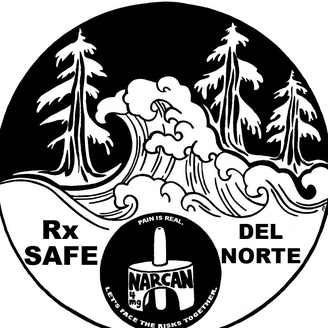Jessica Cejnar Andrews / Monday, Aug. 26, 2024 @ 3:53 p.m.
Organizations Combating Opioid Addiction Launch Initiatives Ahead of Overdose Awareness Day

Rx Safe Del Norte logo
A plethora of organizations in Del Norte and Humboldt counties are launching two initiatives aimed at increasing access to, and teaching folks how to use Naloxone, the medication that can reverse an opioid overdose.
The North Coast Life Line and Naloxone Sticker Project will launch on Saturday, Aug. 31, International Overdose Awareness Day. The first program teaches people how to use Naloxone, how to report an overdose and where to find prevention, treatment and harm reduction resources.
The Naloxone Sticker Project provides a link to those resources via a QR code. The goal of both those projects is to increase Naloxone saturation in the two communities, Rx Safe Del Norte representative Jermaine Brubaker told the Wild Rivers Outpost.
Those stickers will be on Naloxone boxes distributed throughout Humboldt and Del Norte counties linking folks to the North Coast Life Line and the North Coast Resource Hub.
Rx Safe Del Norte is working with Rx Safe Humboldt, the Yurok Tribe Wellness Coalition, United Indian Health Services, the Humboldt and Del Norte County Departments of Health and Human Services, Providence’s ER Bridge Program, Wellpath, the Humboldt Area Center for Harm Reduction and Aegis Treatment Centers.
“We’re hoping this reaches the people it needs to and it informs people,” Brubaker said. “Because Narcan is now available in schools. If it ends up in a parent’s hands we want them to know how it’s used, why their kid has it and what [the] safety precautions are like how to use it, how to talk to your kid about it — we even have links to the youth overdose prevention toolkit in there. It has lots of resources for parents and educators.”
International Overdose Awareness Day is dedicated to those who lost their lives to overdose.
These two initiatives come as Rx Safe Del Norte and the Del Norte Behavioral Health Branch work with Aegis to open a facility in Del Norte County. Currently between 34 and 40 Del Norte residents visit the Aegis center in Eureka daily for methadone treatment, Brubaker said. Most are MediCal patients.
However, while the number fluctuates Shiann Hogan, deputy director of the Behavioral Health Branch, said an estimated 60-plus MediCal patients travel from Del Norte to Eureka for methadone treatments. Some may be able to receive their methadone doses at home, but most travel to Eureka.
Hogan said Aegis representatives were in Del Norte County last week scouting potential sites to save patients a four-hour trip.
“The next hope would be that there may be that a mobile unit could potentially dispatch out from there to more rural areas such as Klamath,” she said. “But at this point, Aegis is actively looking at placing a facility in Crescent City.”
According to Brubaker, when Open Door started Rx Safe Del Norte in 2016-17, Del Norte County’s opioid prescription rates were 1,200 per 1,000 prescriptions.
As of 2022, the prescription rate in Del Norte was about 500 per 1,000 prescriptions, according to the California Overdose Surveillance Dashboard.
Since she began working with Rx Safe Del Norte in 2019, Brubaker has been part of several local efforts to make Naloxone and opioid treatment more accessible. This includes participating in the Reaching Rural Initiative with District 2 Supervisor Valerie Starkey, Judge Darrin McElfresh and other Del Norte County representatives.
On Friday, Brubaker said Rx Safe Del Norte is working on establishing harm reduction vending machine, which allows people to access Naloxone 24/7. Those vending machines would likely be at the public health office, possibly Del Norte Mission Possible as well as in Smith River and Klamath.
Brubaker said she hopes the Naloxone Sticker Project, which also includes information on reporting an overdose, will help Rx Safe Del Norte figure out where it should target its outreach.
CLICK TO MANAGE